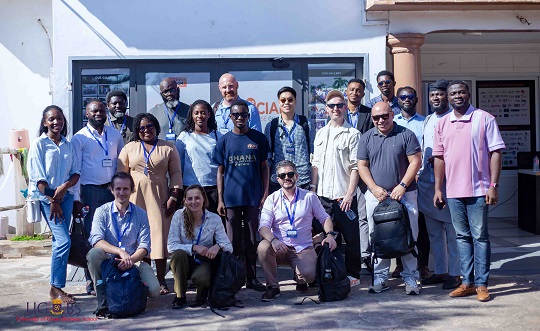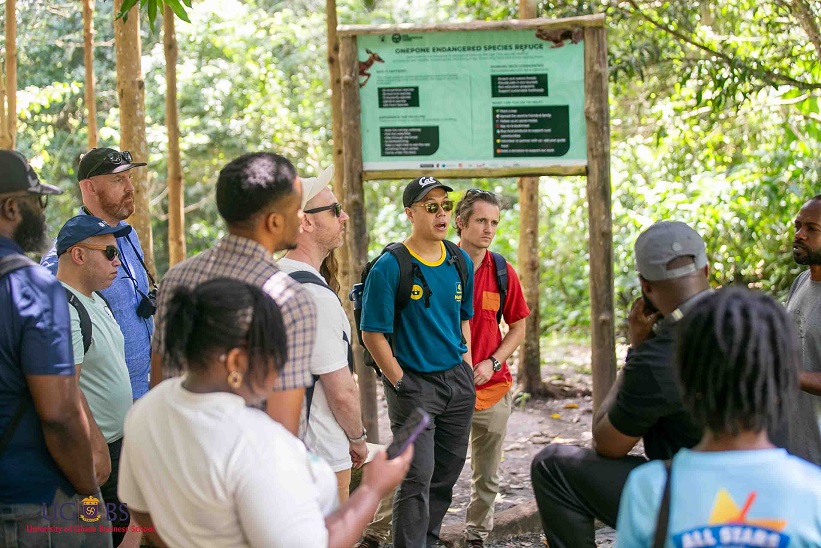
UGBS International Relations Office Hosts GNAM Week on Social Entrepreneurship and Fintech
The International Relations Office of the University of Ghana Business School (UGBS), from 13th to 17th October, hosted another successful edition of the Global Network for Advanced Management (GNAM) week to foster the school’s commitment to global engagement and experiential education. The event was held at the UGBS Graduate Campus, bringing together participants from the University of California, Haas School of Business, The American University in Cairo, Yale School of Management, University of New South Wales (UNSW), and ESMT Berlin, and UGBS.
Prof. Elikplimi Komla Agbloyor, Coordinator of the International Relations Office, welcomed participants with an overview of the University of Ghana and the Business School. He also shared insights into Ghana’s cultural and economic development. This was followed by lectures from Dr. Baah Aye Kusi and Dr. Emmanuel Joel Aikins Abakah, Senior Lecturers of Finance at UGBS, who discussed Social Entrepreneurship and FinTech.
Dr. Emmanuel Joel Aikins Abakah presented on Ghana’s FinTech ecosystem, calling for greater adoption of blockchain and digital asset technologies across Africa. He cautioned that without innovation the continent risks being left behind in the global digital economy. Dr. Abakah highlighted the lack of policy continuity as a major challenge and stressed the importance of developing indigenous technological solutions suited to African contexts. He concluded that Africa’s unique challenges present opportunities to build a digital economy tailored to its people’s needs.
As part of the week’s activities, participants paid a corporate visit to MTN Mobile Money Limited (MoMo), the fintech subsidiary of MTN Ghana, to learn about the evolution of mobile money in Ghana. Mr. Shaibu Haruna, CEO of MTN MoMo, shared insights on the company’s business model, governance framework, and its contribution to Ghana’s economy. Mr. Haruna revealed that MTN Momo is actively working with regulators and fintech partners to make intra-African money transfers easier and cheaper. The initiative aligns with the African Continental Free Trade Area (AfCFTA) agenda to enhance financial integration across the continent.
In a guest lecture, Mr. Godfed Razak Assan, Fintech Oversight Officer, Bank of Ghana, and Ms. Nana Ama Serwah Asamoah-Danso, Bank of Ghana, presented on FinTech Regulation in Ghana. They mentioned that Ghana is positioning itself as a regional leader in digital finance, promoting innovation, financial inclusion, and a fully connected cashless economy. They revealed that a pilot project is currently testing limited cross-border transfers, such as sending money to Nigeria, under strict regulatory oversight. The team noted that Ghana is exploring integration through the Pan-African Payment and Settlement System (PAPS) to promote trade and payments within Africa using local currencies.
Dr. Baah Aye Kusi, delivered a presentation on social entrepreneurship, highlighting its challenges, opportunities, and the way forward. He explained that social entrepreneurship involves applying innovative and sustainable solutions to address societal needs, with a strong focus on empowering the disadvantaged and marginalised. Dr. Kusi emphasised that impactful social entrepreneurship is driven by passion, guided by purpose, and sustained through measurable impact. Dr. Kusi further explained that successful social enterprises require not only passion and creativity but also sound business knowledge and collaboration to achieve lasting impact.
On a corporate visit to Social Enterprise Ghana (SEG), Mr. Kwame Asante, Monitoring, Evaluation and Learning Assistant, SEG, on behalf of Dr. Edwin Zu-Cudjoe, Executive Director of SEG noted that social entrepreneurship is one of the most practical and sustainable ways to address Ghana’s social challenges. He, however, stated that Ghana currently lacks a legal framework for social enterprises, forcing many to register as either NGOs or traditional businesses. To address this gap, Social Enterprise Ghana has drafted a national social enterprise policy and is engaging stakeholders to push for its adoption.
Participants also visited Soronko Academy to explore social entrepreneurship from a gender perspective. Founder and CEO, Mrs. Regina Honu, shared her inspiring journey in technology and her motivation to empower women and children with digital skills. Mrs. Honu gave participants a firsthand experience of how they are nurturing the next generation of digital leaders. Speaking on the rise of AI, she stressed the need to build the confidence of women to participate in the digital economy, and localise data, ensuring technology reflects African realities, especially women, rather than imported biases. Throughout the week's event, participants engaged in various enriching activities, including guest lectures, games, a tour of the UGBS Innovation and Incubation Hub, a visit to the Kwame Nkrumah Mausoleum, and a trip to Amedzofe.
